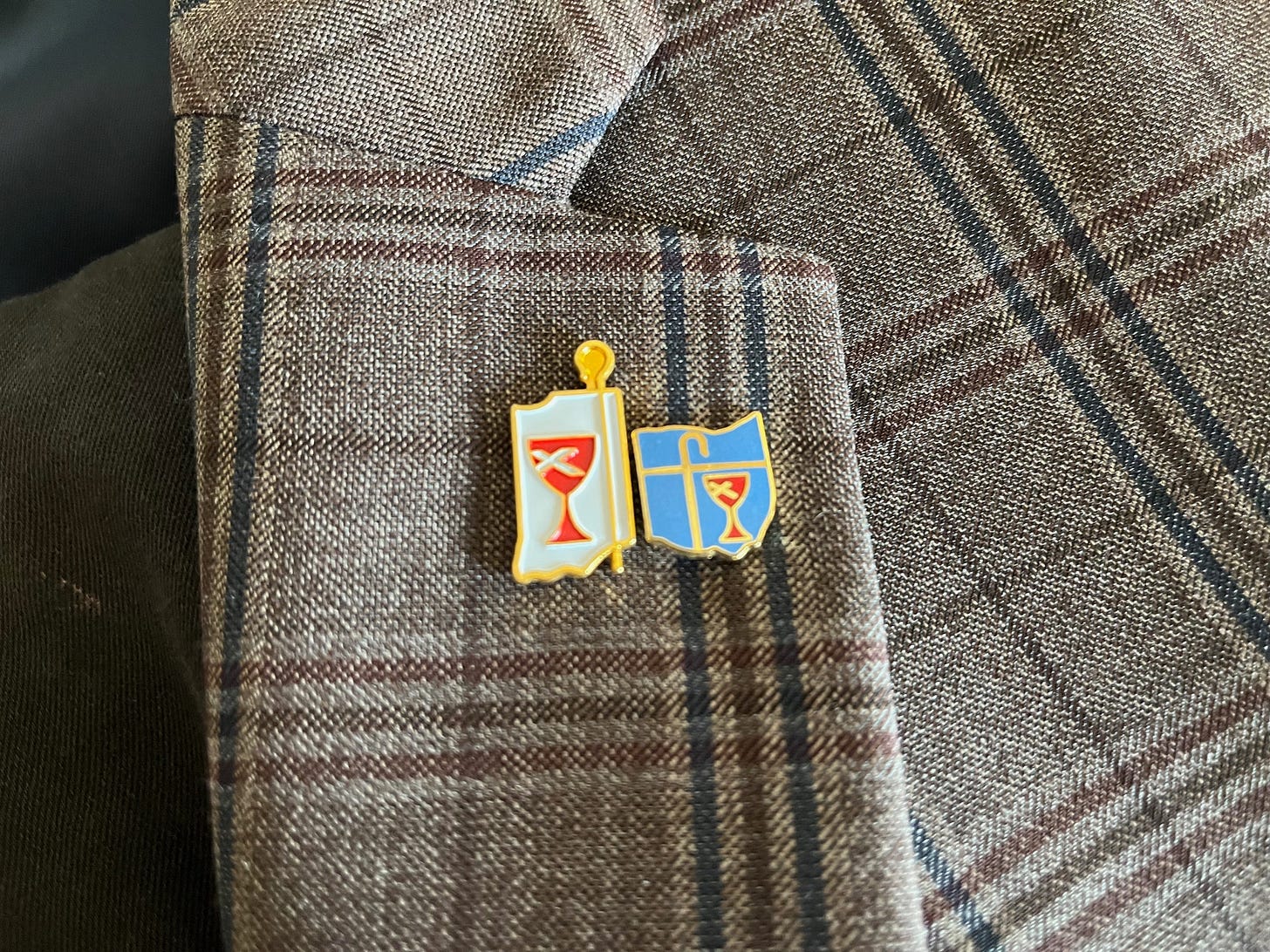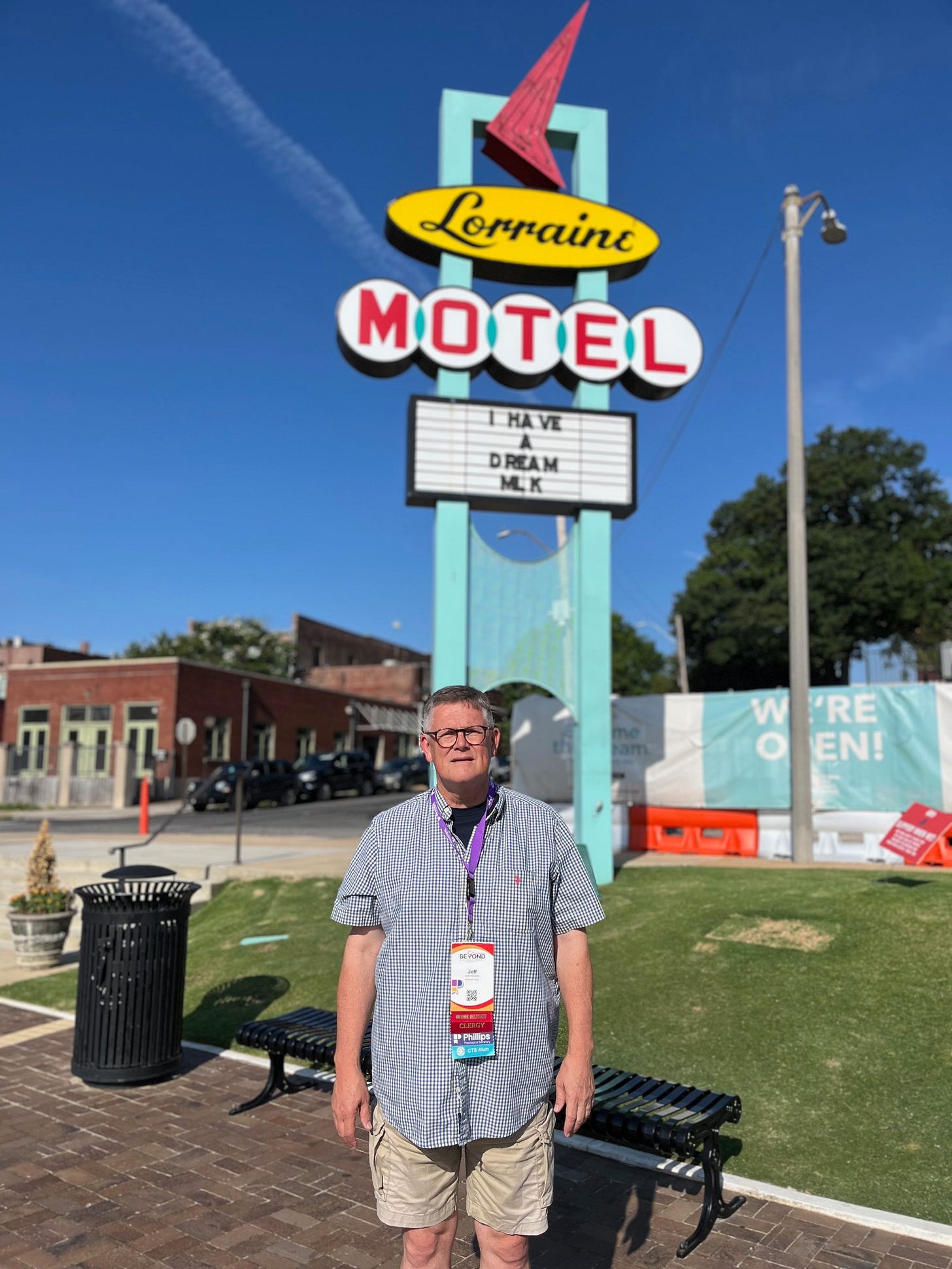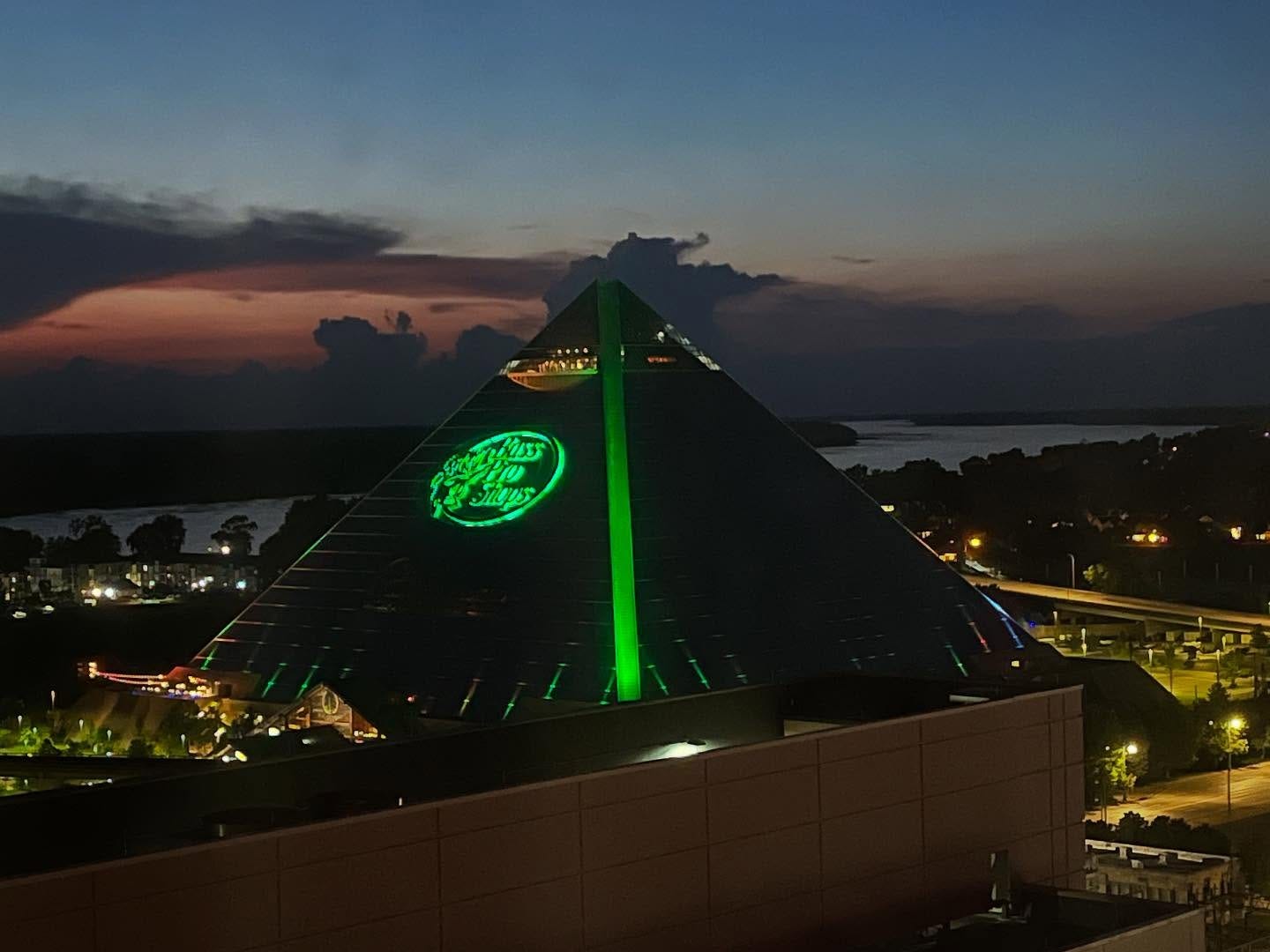General Assembly 2025, review & ruminations
The road to Memphis and "Beyond" for the Disciples of Christ
A week and a half later, I’m still pulling together my thoughts on the just completed General Assembly. We left July 16th . . . well, quite a few left on Tuesday, the 15th, before the evening closing worship, but there was a good turnout. I’ve been to General Assemblies (GA from henceforth) with over twice the registered attendance but fewer at the concluding communion.
How many were present? The last solid number I heard was just under 2,600. We’ve bounced between 4,000 in Orlando for the 2013 GA and 3,800 in 2023 at the Louisville GA; Des Moines in 2019 claimed 3,236 . . . and our meeting in Memphis felt very comparable, even if 600 some fewer present.
Those 600, multiplied times fewer hotel reservations and banquet tickets, can be the difference between meeting a “mandatory minimum” for a booking, which is why the General Board is being cautious about signing contracts for a 2028 GA. If you assume a minimum set of numbers around, say, 2,500 and the actual attendance is 2,300, it’s not the loss of 200 event registrations and $50,000 in lower income from that, it’s the penalty the General Board or Office of General Minister and President (OGMP) would be expected to pay under the three-years-in-advance contract for missing that target.
That could be upwards of $150,000 to $250,000 or more, and there’s no budget for that. That’s the risk involved in signing a contract for a convention center in the summer of 2028; you book the space, but the price is largely paid in your guaranteed minimums for room reservations and banquet seats.
I’ve already heard, on the Memphis Convention Center floor & on social media, “why not meet in a different venue?” Sure, we could. But on one hand, you almost guarantee you’ll have lower attendance in a smaller setting (cheaper = smaller), and on the other hand, even if we resigned ourselves to a 1,000 person GA, we Disciples don’t have a whole bunch of megachurches. You may have noticed. We could book a college gymnasium and dorm space and hold picnics, but logistically you would see the whole event adapt in some unexpected and I would argue unwelcome ways. You can make the GA so cheap to attend no one comes. (Hat tip, Yogi Berra.)
So I don’t know what the right move is. I’m confident we have smart, motivated people in our church leadership who are looking at this. Our divided cousins in the independent Christian Churches/Churches of Christ shifted the long-larger North American Christian Convention to a two-event program, with SpireConference held now at a very large church in Louisville across three days, two nights, for the workshops and breakout sessions, mostly aimed at ministers, and ICOM, their “International Conference on Missions” with more of the Exhibit Hall we expect, and worship events in a convention center space, but also a short three days . . . and I hear they’re sweating the details on making their budgets work. Plus ICOM is separate because of their whole approach to funding missions, which is part of why we are two separate church bodies. Anyhow.
The Presbyterian Church USA & United Church of Christ hold events in the size we’re moving into, but they are delegate assemblies, and the support for the General Synod or Assembly in each is built into their funding process. Neither has the “y’all come model” we do, and they’ve expected their wider churches to cover a significant part of the costs. Our GAs have always been internally self-supporting, so to move into a model where the costs are subsidized asks the inevitable question “paid by whom?” United Methodists have a highly governmental model, and they have apportionments.
Me, I could see a fun bare-bones event in Indianapolis with sessions in Hinkle Fieldhouse on the Butler University campus, but trust me when I say we’d be paying market rates for the hall, and we’d be paying out the schnozzle for shuttles as even the dorms (which campuses don’t rent out in the summer they way they used to for events, which is another long discussion we’re not having here) are far away from Hinkle, and you may have noticed that more and more of us at these events are having trouble walking long distances, even inside of an air conditioned conference center.
In other words, the very nature of the event is going to change. Because our culture is changing, both the wider culture in which we live and move and have our being, and our own church culture as Disciples.
For instance, I brought a suit jacket, dark pants, and a tie to Memphis. It was a last minute addition to my car, and I had the thought “I will not wear this” but the impulse to have it was too strong.
On the lapel, I put my Ohio region pin, and my dad’s Indiana region pin. Dad took a suit jacket and tie to Des Moines, his last, and was surprised to see me heading off to opening worship in blue jeans. He never wore the jacket at the GA, but he always took one.
If I go to another GA, I probably won’t take a suit jacket. If I do, I won’t take a tie. Todd Adams at the Pension Fund Breakfast looked good, as he always does: he didn’t wear a tie. Dick Hamm put a tie on for the closing worship with the addresses from our previous General Ministers of which he proudly is one, and I suspect I know exactly how Dick felt as he stood at the mirror that evening before putting it on. And I get why he did. Next time? Probably not.
The hanger with jacket, dress pants, tie in pocket, just barely made it back into my car before driving home Wednesday. I almost stayed another night in the Memphis metro area; after paying my respects at the Lorraine Motel & Civil Rights Museum . . .
. . . I went on south in Memphis to take at least a token look at Graceland, for Paul Simon if not for Elvis Presley.
I parked by the famous wall, took a few pictures as the first tour buses of the day pulled up for tourists to see the Jungle Room (ask Geoff Mitchell about his Lindenwood connection story to Graceland), and got back in my car. Which did start, but the “Check Engine” light shone like a National guitar.
Long story short, I got to a dealership, sat a while, found out what I was up against, missed the last business session while I chatted with the fine folks of West Memphis, Arkansas, then a team member drove me back across the mighty Mississippi to the convention center, and promised to pick me up in the morning, so I got to attend closing worship. Jesse did pick me up at the hotel, took me back to where my car was still awaiting a part, and without getting into gory details they got me on the road late that afternoon. It only cost me $Y,YYY.
Which I recount for two reasons. One is, while we all know it, I’m not sure we talk candidly about it: I paid my own way to GA. Granted, I no longer serve a congregation as a minister. But from 1987 to 2019, the percentage of the total cost of going to a GA paid by the local congregation for their minister or lay representatives steadily went down. You can say the costs increased, which they did, and you can say local church budgets are constrained, which I know they are.
But the whole GA model as many of us have known it in the past is built on the idea that your church is “covering” the GA, as a mission expenditure. Some of us would never pay $30 for supper, or $15 for a quick lunch, but at the GA it’s all folded into the registration process and in theory the total cost and in past practice all paid by your church treasurer from the common pot. Your church “sent you” as a messenger, in both directions as it were, and you took vacation or time from family or did whatever you did to go, and in appreciation the church paid your registration, your mileage, your lodgings, and often meals en route and yes, those fun meal events at the convention center (which are built into the fee model for an organization reserving the event space, remember). I recall a fuss in Indiana when a GA was set in Anaheim, California and our local leaders active with the region pointed out we would spend more that summer to send the minister and lay representatives as an act of fellowship, so they could see the Disciples of Christ in southern California, and they would know we Hoosiers cared about our fellow Disciples there.
It was still a bit of a fuss. 1981, and the long-standing “local church pays the costs of GA through supporting those who went” model was starting to shake. It was getting wobbly in 1999 when we met in Cincinnati; my dad had his costs covered by his congregation as a lay representative, and frankly I think they got their money’s worth out of the trainings and encounters he had there, and what he took back to the men’s ministry and the elders in Valparaiso. But he was outright angry that while I had a short trip within Ohio, my costs were about half covered by the church I served then. The two lay representatives noted they would pay their own expenses, but asked the church to pay their registration; I was told I could do the same, plus submit mileage. That was it, though. Dad was ticked. “They’re supposed to pay your expenses to go to assemblies!” But that’s a norm, a custom, not a rule.
We shared a room in Charlotte for the 2003 GA; I offered to pay half, and he asked if my church was reimbursing me. I said they would not be; he said Valparaiso would take care of it.
Lots gets blamed today on COVID and the many and various stresses around that episode, but I’m here to tell you the problem of how to pay for GA was bad and getting worse for all sorts of ministers in most regions well before 2020. Intensified by the fact that for many of us, ministry has become, well . . .
Okay, do NOT yell at me for saying this, but I’m trying to make a tricky point here. Ministry is for many of us a hobby, an expensive hobby, and one our spouses and partners are helping pay for. When our hobby is restoring antique cars, and the spouse makes most of the incomes, they get a vote on whether or not you can just go pick up a new torque converter for the Packard in the garage you’re reconditioning. Enough zeros on that bill, and they get a veto. Right? Well, when you are paying out of the household budget for the trip, the lodgings, and you pause over each breakfast or lunch or dinner (and skip clicking a few in hopes of finding an off-site lunch during one you can afford to miss), let alone the registration itself, that’s a couple of heavy duty car parts right there.
Plus, you drive 650 miles in a car with 209,000 miles on it, and stuff happens. Which adds to the total bill. It now costs $X,XXX to attend a GA even skipping two nights and a few of the event meals you used to attend, plus the repair bill to get back home at the end for $Y,YYY, and now you’ve spent $Z,ZZZ. Of your family budget. And please don’t tell some of the clergy spouses out there they should be happy to help. They gave at the office (and in the congregation). The ROI here is hard to defend.
Now do you see why the Time & Place Committee of the General Board is hesitant about locking in a commitment for 2028? Especially when I am morally certain the minimums are at least 2,000 and probably higher for paid attendees. I doubt I’m going, so we’re already down to 2,599. And dropping fast.
But I said I had two reasons for talking about my adventure from Graceland to West Memphis before making my way home . . . by way of stopping to have a meeting with my sister and our mother’s care team, which is another set of $X’s & $Y’s which could be a third reason money and ministry intersect awkwardly with GA planning. The other reason has to do the conversations I had at the dealership.
Between two days I spent over ten hours at the dealership. I talked to schedulers, mechanics, supervisors, floor salespeople, used car managers, transportation staff, secretaries. And honestly, it wasn’t because I was in a talkative mood. The prospect of a) having to stay an extra night in West Memphis waiting on a part, a very real possibility for much of the day, and b) the $Y,YYY I was going to have to spend even before driving another nine hours through thunderstorms up the Mississippi valley, had me pensive and even a bit peevish.
First, the folks there were friendly. I give them five stars. Seriously, I went online when I got home and gave the service department and the whole dealership five stars. They earned it. People came up to me, asked if they could get me anything (“Why yes, a transmission control module!” which they all thought was incredibly funny of me to ask for), and asked what brought me to West Memphis. I explained, and the conversations went on from there.
About God. The Bible. Jesus. Aging parents, tough decisions. Worries about the future, and the hope faith can give in support of uncertainty. Loss. Death. The departed, and our relationship with them. Prophets, and how they rate (one fellow and I had a long talk about Isaiah vs. Amos as league leaders). Trust, and where it’s gone (“and look at me telling you about trust when I work for a dealership and you work for God!”) and how we can get it back. About God, and how God speaks as we struggle with relationships and hard decisions.
In one way, it was just another day in parish ministry. It was also a reminder of the realities of being a Christian in the world as it is, among other Christian understandings, and in the midst of other perspectives on faith and the meaning of life to which our beliefs are, frankly, in direct contradiction. “Get what you can while the getting is good” makes sense from a certain set of presuppositions; “trust in the Lord” can stand in opposition to that viewpoint, but it’s not a recommendation to go to the casino in order to get the cash basis for doing the right thing. Is it?
I truly hope I represented the living God, Jesus my hope, and the church of my upbringing well. But it was a long, long way from the General Assembly floor (or Exhibit Hall, or Banquet Rooms) to the dealership waiting room. This isn’t meant as a cheap shot at GAs, because they require a certain amount of procedure and process and program, and I’m down for it all. I’m a process kind of guy in many ways. There’s not just a place for it, we have to have it.
What my time at the dealership reminded me of was how much hunger there is out there for the most basic aspects of religious belief and practical application. How do I face the fact that people I love will die? Is there something about my life that has a lasting meaning and purpose, beyond the events of the present day and passing fancy? Does it really matter what I do, who I marry, why I go to work? Help me understand all that, even as I have to spend a big part of my life at work, doing things I barely think about, but occasionally looking up and realizing I’m helping other people with similar questions about their lives, and my own.
Somehow, we need to make sure we’re keeping our General Assembly plans in touch with the culture to which we’re preaching. What’s the witness we have to bring to the time and place we find ourselves in?
The closing worship included an extended meditation on the work of the Disciples of Christ as interpreted by John Humbert, who talked about the use of technology as a tool for ministry; by Dick Hamm who spoke about the immediate application of Micah 6:8 and how we can do justice, love kindness, and walk humbly with our God; by Sharon Watkins who reminded us (and I was proud of how the whole hall resounded with the shared statement) “We are are a movement for wholeness in a fragmented world. As part of the one Body of Christ, we welcome all to the Lord’s Table as God has welcomed us,”; and by Terri Hord Owens who called us yet again to spiritual disciplines and Biblical literacy.
All of that was good and right and proper, yet we still need to have the right application of all that, into the lives of the people we are inviting into relationship within this church.
How that could work, I think will require a further installment. And a little more context from Dr. Lee Butler, formerly of Phillips Theological Seminary now of Iliff School of Religion, who has some things to say about pyramids and Egypt and the American Nile and bondage and the Bible Belt and the No-Sin Zone in which we most emphatically do not find ourselves.
One more entry before I’m done with Memphis, that’s for sure.







I can attest that both Spire and ICOM do indeed have similar issues. The cost to attend continues to grow while the overall attendance shrinks. It is a contributing factor leading to the slow disintegration of the independent Christian Churches/churches of Christ, in my opinion.